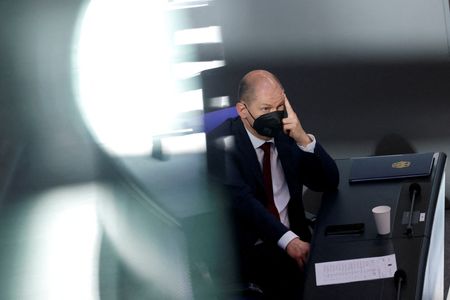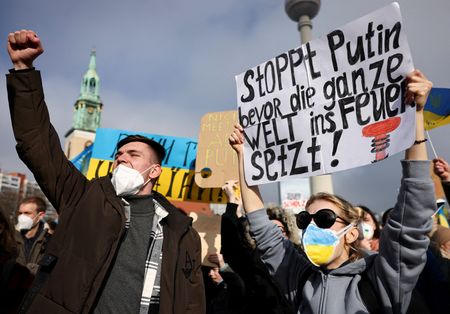
Putin forces Germany to step up to role as global power

By Sarah Marsh and Sabine Siebold
BERLIN (Reuters) -Russian President Vladimir Putin has inadvertently achieved what Western allies have long struggled to: get Germany to step up to its role as a major global power with an assertive foreign policy backed by a strong military despite its World War guilt.
German Chancellor Olaf Scholz announced on Sunday a dramatic hike in military spending in view of Russia’s invasion of Ukraine in what is being heralded as a historic speech that marks a paradigm shift in German foreign and defence policy. Scholz said Germany from now on would invest more than 2% of economic output on defence up from around 1.5 % currently, after years of resisting pleas from NATO allies to do so, and set up a 100-billion-euro ($112 billion) fund to re-equip the military.
He also outlined plans to reduce Germany’s dependence on Russia for half its gas needs, fomenting hopes Berlin could consider geo-strategic concerns more in all its trade relations. “Putin’s war” marked a break in German foreign policy, he said, adding “the requirement is as much diplomacy as possible without being naive”. “This historic speech marks a sea change in German foreign policy,” said Thorsten Benner of the Global Public Policy Institute (GPPI). “It’s a starting point for a further fundamental re-think as part of Germany’s National Security Strategy that will also have to include challenges posed by China seen in tandem with Russia.”
Germany has for decades faced criticism for not playing a role on the world stage commensurate with its size as Europe’s largest economy and overlooking geo-strategic concerns in its pursuit of economic opportunities. That stance came under intense scrutiny throughout the Ukraine crisis, leading some commentators, especially in top security ally the United States, to call Germany the weak link in the NATO western military alliance.
Successive German governments supported the construction of the Nord Stream 2 Baltic pipeline to pump gas from Russia directly to Germany despite Western allies’ concerns it would undermine the security of traditional transit country Ukraine. Berlin also last week resisted calls to cut Russia off the SWIFT global payments system as part of a Western sanctions package, saying it would then struggle to pay for Russian gas. In a 180 degree turnaround, Scholz last Tuesday suspended Nord Stream 2 and on Saturday agreed to cut Russia out of SWIFT and said Germany would build up its coal and gas reserves and quickly make good on long-stalled plans to built LNG terminals.
Most policy shifts came after on Friday “it became more obvious what Putin had done, and that we have to leave the old ways,” a highly-placed German government source told Reuters. “Saturday was also the moment when we and others in the European Union realized we have to do something on SWIFT because it became such a symbol,” the source said.
WAKE-UP CALL
Germany’s military had long pleaded for more equipment and the army chief vented his frustration over the long-running neglect of military readiness on LinkedIn on Thursday a few hours after Russia invaded Ukraine. German forces were drastically scaled down after the end of the Cold War – with the number of battle tanks drawn down from more than 3,500 in the 1980s to 225 in 2015. Later the forces were trained mainly for missions such as in Afghanistan where the adversary was poorly equipped and not an armed force with the most modern weapons.
Germany’s new three-way coalition vowed when it took office in December to pursue a more values-based foreign policy reflecting growing anxiety over the rise in authoritarianism worldwide and threats posed by strategic rivals like China. However the coalition – which includes the Greens, borne out of the pacifist movement of the 1960s, and fiscally hawkish Free Democrats – did not commit to increasing defence spending to back up a more assertive foreign policy.
It also came under fire in recent weeks for refusing to deliver weapons to Ukraine given a German taboo on exporting arms to conflict zones. All that changed too this weekend. On Saturday Scholz said Germany would supply Ukraine with 1,000 anti-tank weapons and 500 Stinger surface-to-air missiles from its military stocks.
On Sunday he announced a 100-billion-euro new fund – worth twice last year’s annual defence budget – to modernize its military, including to buy armed drones and new fighter jets. “It is clear that we need to invest significantly more in the security of our country in order to protect our freedom and our democracy,” he told an emergency session of the Bundestag lower house of parliament. “We need planes that fly, ships that sail, and soldiers who are optimally equipped for their missions.”
Terry Anderson, who served as the U.S. defence attache in Berlin from June 2015 through July 2018, said the Russian invasion was clearly a “humongous wake-up call”.
“They put so much stock in talking. But you know diplomacy without teeth behind it is not going to be effective,” he said. Tyson Barker, head of Technology and Global Affairs at the German Council on Foreign Relations, said: Germany just became a normal power”


















POST COMMENTS (0)